- Home
- Jeff Mariotte
Close to the Ground Page 11
Close to the Ground Read online
Page 11
But he’d been walking away from the main streets, just wandering as he mulled over the attack and its possible ramifications. He wasn’t sure where he was now — a dark and quiet neighborhood of closed shops and silent upstairs apartments.
He was stopped on a corner, looking for street signs, when the car pulled up beside him. It was a huge black Ford Excursion with dark tinted windows.
Not again, Angel thought. He was still tired from the last battle — it had taken a lot out of him, and he was distracted from thinking about Karinna and wondering why groups of armed men were after her — and even when the vehicle’s doors opened and four people came out (but they weren’t people, he knew, not really), he had to force himself to focus on them.
When he did, he saw that they really weren’t men at all.
They were demons. Four of them. They looked strong, they looked fierce, and they looked dangerous. The smell of them, earthy, like freshly turned loam, struck his senses.
Or like graveyard dirt, he thought.
There was one who stood seven feet tall, with long powerful arms that ended in hands the size of small houses. The backs of its hands were horned, five ridges of bone that looked knife-edge sharp. Its skin was sky blue, and its long tangled hair was the color of summer wheat.
Another was shorter, barely five feet tall, and the same measurement wide, like a beach ball with stocky legs. It had white hair growing in tufts all over its body. The overall effect was comical — except for the four rows of spiked teeth glistening inside its huge mouth.
The next was as gaunt as an ancient man, stick thin, with dull yellow eyes sunken into its skull and a dour expression on its face. It wore a tall hat and an old-fashioned suitcoat and baggy slacks, and in long slender fingers it held a staff, as tall as it was, with a hook in one end. This demon was very still — Angel had to watch it for a moment to be sure it was alive — but its long fingers moved and twitched around its staff, independently of the rest of it, like the legs of many spiders.
The last looked female, though Angel knew that was no more likely than the possibility that the rest were male. You just couldn’t tell with demons like this — form followed function. The arguably female one looked, for all intents and purposes, like one of the many L.A. beautiful people. Under other circumstances Angel would have thought she was a young starlet. Her luxurious hair was long and as black as the deepest night. Her pale face held eyes of a startling cobalt blue and crimson lips parted in an open-mouthed smile. She wore a tunic of a diaphanous gold fabric, and beneath it Angel could see a shape that would make a centerfold weep. She appeared to be one of the most beautiful women he had ever seen.
The illusion held until her skin started to ripple and bulge. He watched in shocked fascination as — whatever it was, beneath her flesh — moved inside her. It took Angel a moment to realize what he was seeing, and even then he didn’t believe it. He’d heard of it—it was called a Maelabog demon, he was pretty sure—but he’d always believed it to be a myth.
Now he was convinced. Her skeleton — its skeleton, he reminded himself — was revolving, slowly turning around beneath it skin. It was meant to frighten enemies, and Angel had to admit that it was effective.
Recognizing the Maelabog clued him in to what the one with the staff was, as well. A demon called Mr. Crook, star of stories told by Irish peasants to frighten their children in centuries gone by.
If these two were Gaelic, chances were the others were as well. But Angel, in his Irish days, had not been as well acquainted with the demonic world as he was now. He had not paid close enough attention to the stories, tales of Faerie, of the Sidhe, of the Otherworld.
One thing he did know, though. They weren’t here on a social visit.
“Look, it’s been a really long night,” he told them. “I’m not up for whatever it is you’ve got in mind.”
Mr. Crook slowly tilted his head down. His eyeballs moved independently of each other, and he fixed one on Angel. “Your name is Angelus,” he said. His voice rasped like a door that hasn’t been opened in a hundred years.
“Used to be.”
“You will accompany us,” Mr. Crook said.
“I know you’re probably not much on conversation,” Angel said. “But there are rules, you see. Give and take. I say something, then you say something that relates to what I said. If you just ignore me, it makes me feel like you don’t value what I have to say. And that’s just plain rude.”
“You will accompany us,” Mr. Crook rasped again.
Angel waved a hand at them. “Okay, now you’re starting to make me angry,” he said. “I’m just going to walk away before I really get peeved.”
The short round one clacked its teeth together like a mad castanet player. The tall one shuffled forward a couple of steps, toward Angel. Even the Maelabog stopped turning, almost back to the beginning stage, which gave it an odd protrusion in the left side of its face and a sunken look in the right. Its pelvis, too, was slightly out of line, and there was nothing beautiful about it now.
“You will —” Mr. Crook started.
“I know,” Angel said. “And thanks for the invite, really. Very kind. But I’ll pass.”
Even as the tall blue-skinned one reached for him, Angel knew they weren’t going to just let him go, though. One didn’t gather four Gaelic demons and set them on someone if the plan was to let him walk away. He counted himself lucky that he was still standing — had they wanted to, they could have killed him the moment they saw him.
Angel vamped out and dodged the blue one’s long reach — dodged straight into Mr. Crook’s staff, swung at him with unexpected strength and speed. It slammed into Angel’s temple, and he saw a flash of bright light, then the world started to dim.
As he struggled to maintain his balance, the blue one caught him with a backhanded punch. The horny knobs ripped Angel’s skin, and he cried out in pain. He grabbed one of the demon’s hands and yanked, pulling the tall creature off-balance. It fell to the sidewalk, and Angel kicked it twice in the head.
But the staff hit him again, this time in the throat. Angel gagged and stumbled, and it came again, jammed into his stomach.
He fell to his knees. Shaking his head to clear it, he looked up just in time to see the beach ball plowing into him. Its rotund body was amazingly firm — more of a medicine ball effect than beach ball, after all. Its arms could barely reach past its bulk, but the impact of it knocked Angel back to the ground.
When he tried to regain his footing, the Maelabog was there, holding something that glittered in its hands. Its skeleton was back to normal now, and Angel once again had the sense that he was in the presence of intoxicating beauty. He looked at her — it — through blurring eyes, and then realized that what it held was a rope.
More specifically, a kind of lasso. The Maelabog twirled it once and threw it around Angel, then pulled it tight. His arms were pinned to his sides.
It wasn’t much of a rope. Breaking it should be a piece of cake. He flexed.
It held.
He tried to reach it, but his arms were held down tightly. Much more tightly than if it were just the rope. Angel caught a whiff of something strange on the air. Ozone, and a coppery tang, almost like blood.
The taste of magic.
Enchanted, then.
He stopped struggling, knowing it was pointless.
Four demons from Gaelic legend, armed with an enchanted rope. And they’d caught Angel when his guard was down, when he was focused on Karinna instead of his own security. When he was tired from a big fight, and worried about the girl.
Someone had gone to great lengths to capture him.
He guessed he’d learn who it was, and why.
Not that I have any choice . . .
CHAPTER TWELVE
“Welcome to my home, Angelus,” a voice said.
Angel opened his eyes.
When he’d been taken into the SUV, he’d been hit with some kind of slumber spell. He had no idea how much ti
me had passed between then and now, and there was no window in this room to the out-side, no clue as to whether it was day or night.
“Call me Angel.”
In point of fact, there wasn’t much in this room at all, now that he looked around. It was vast and cavernous, but largely empty. The floor was smooth gray stone. The walls were rough gray stone. The ceiling was high — either really high, beyond the light cast by torches mounted in iron sconces at intervals around the room, or not quite as high but painted black.
Besides the sconces, Angel could see a wooden cabinet of some kind on a far wall. Next to that was an opening in the rock, and through the opening was the beginning of a flight of stairs leading up and away.
Which was where Angel wanted to be. Except he was standing against the rock wall, arms extended far out to his sides and slightly higher than his head, held there by iron manacles. Angel guessed that these were also enchanted, as he was unable to break free of them.
Standing before Angel, at a distance of about six yards, was a man.
“Old habits are hard to break,” he said.
Angel studied the man. He seemed to be in his seventies, maybe late seventies. He was old and lined and looked battle-weary. Wispy white hair covered some of his head, but patches of smooth pink skin showed through, as if his scalp were younger than the rest of him somehow. His bright blue eyes held an elfin twinkle, like a smile lived there that didn’t reach his mouth, which was set and somber. He wore a simple white cotton tunic and slacks, with white hemp sandals on his feet.
“I don’t know you,” Angel replied.
“Nor I you,” the man said. “But I’ve seen you. I’ve heard of you, time and again over the years.”
“You have the advantage, then.”
The man took several steps forward. “Forgive me,” he said politely. “My name is Mordractus. I, like you, am from Eire.”
The name was familiar, but Angel wasn’t going to give him the satisfaction of revealing that. “You don’t sound Irish.”
“Nor do you. The price of living a rootless life, I imagine. I have stayed close to the Auld Sod, lately, but I traveled extensively in my younger days. These past years I’ve remained largely isolated, though. I’m afraid my accent, like so many these days, comes more from television than anything else.”
“Whatever,” Angel said, in no mood to stroll down memory lane with this guy. “Mind telling me why you’re holding me prisoner here?”
“You might recognize this house if you saw the outside of it,” the man said, as if Angel hadn’t even spoken.
“I doubt it. I don’t go in for those open-house tours.”
“It belonged to a man named Pennington. Arthur Pennington. He went by ‘The Magnificent Pennington.’ ”
That did sound familiar, but Angel couldn’t place it. He’d have shrugged, but his arms were somewhat occupied at the moment. And going numb, he thought. How long is he going to keep me here?
And what does he have in mind for me after that?
“I don’t know who that is,” Angel admitted.
“He was a student of mine once, many years ago. In the twenties and thirties — the nineteen twenties, that is,” he specified with a chuckle, “when you’re our ages you have to specify these things — he was a very famous magician here in Hollywood. He could have been one of the greats — had the skill of Crowley, he did. But he chose to be well known and loved, like a trained chimp instead of a great magician. He appeared in movies, where his ‘magic’ was nothing but camera trickery, and into the early days of television. You may have seen him on the Ed Sullivan show or someplace like that.”
“I think maybe that’s it.”
“A tragic waste. And now he’s dead, more’s the pity.”
“And you’re not.”
“Exactly my point,” Mordractus said. He turned away from Angel and started walking across the room, toward the exit. “With what I taught him, he could have extended his life almost indefinitely. As I have. But he squandered his gift, wasted his years, and when he wanted to put it to use again, late in life — when he built this room, in fact, beneath his Hollywood mansion — it was too late. A gift like ours has to be used. It’s like a language, or a muscle. If it isn’t used it atrophies and becomes no use to anyone.”
“Fascinating,” Angel said. “You ever planning to answer my question?”
“I’m getting to it,” Mordractus snapped. He stopped, looked at Angel over his shoulder. “Patience, young Angelus. We have plenty of time together.”
“Before what?” Angel demanded.
Mordractus continued his march across the room without answering. When he reached the far wall, instead of going through the doorway he opened the wooden cabinet and took a small pail from a lower shelf. Sticking out of the pail was a wooden handle. He closed the cabinet door and turned back toward the room, and Angel.
“I have lived for a little over five hundred years,” Mordractus explained. “I’ve enjoyed my time. I’m not ready to give it up.”
“You don’t look a day over three-fifty,” Angel told him. “What’s got you worried now?”
The magician walked to the center of the room, stopped, and looked around as if getting his bearings. When he seemed satisfied that he was in the exact middle of the space, he knelt on the floor and grasped the handle that extended from his pail. “I’m dying,” he said simply.
He drew a brush from the pail. On the end of it was a white substance, like paint but not as wet. Angel couldn’t be certain what it was. Mordractus seemed to read his uncertainty.
“Paste,” he said. “Made from the ashes of cremated murderers.”
“Lovely.”
Mordractus began to paint a circle around himself on the gray stone floor, with a diameter of about three feet.
“I’m dying,” he said again. “But I’m not ready to die. My spells won’t extend my life any further, I’m afraid. And to make matters worse, I’ve put something in motion that is taking a lot out of me. Sapping my strength, my life force. If I die before I finish it, the results won’t be pleasant for me.”
“Sorry to hear that,” Angel said. “I’m sure there’s a lesson here. Look before you leap, or something like that.”
“So for the last year, I’ve been looking far and wide for some alternative. Something that would allow me to live on. My forces have roamed the world searching for the answer.”
“I’ve got the answer,” Angel said. “Let me go and I’ll bite you.”
Mordractus finished his circle, carefully joining the ends with his brush. “Not that way,” he said. “Vampires have no soul. I don’t want to be without a soul.”
“Why not?”
“A soul is more than a conscience, although I understand from stories I’ve heard that you view it largely that way. A soul is your being, your very self. Without it, you become someone else—no, some thing else. What is the point, I have to ask myself, of keeping myself alive if I am not really keeping my self alive? And then, there’s the practical consideration. I do magic, you see.” He waved the brush toward Angel as if to demonstrate. Then he turned back to the floor and started painting a long straight line on it, outside the circle. “Complicated magic,” he continued. “You would probably call it black magic, though I might have a quarrel with your definition.
“And much of this magic requires the magician to have a soul. I summon demons from the darkest pits of Hell, and from the Otherworld. The magician’s soul functions as a sort of tag, you see—they know who summoned them, and they obey, because they can read the soul. Without one, the results could be disastrous.”
“So you need your soul,” Angel said. “What does this have to do with me?”
“Don’t be coy, Angel. It doesn’t become you. You are a vampire, I know that. You’re immortal. And yet, you have a soul.”
“Suppose you’re right?”
“That makes you unique, at least in my experience. I had to see you, to study you.”
&n
bsp; “Here I am. Pinned like a butterfly to this wall, and I gotta tell you, I’ve been more comfortable.”
“Yes, well, my apologies for that,” Mordractus said. “You’re very strong. I need to be sure you won’t be a problem for me.”
“What if I make a promise and cross my heart?”
“I don’t think I can trust you, given the circumstances.”
“And they are? The circumstances?”
“That which makes you unique is exactly what I need,” Mordractus said. He reached some predetermined end point in the line he was making, drew a sharp corner, and started a new one. “You are immortal but have a soul. That is exactly the situation I’m after. Therefore, I am going to transfer your life essence — that which makes you immortal — to me.”
“Mind if I ask how you’re going to do this?”
“It’s a tricky ritual, but not impossible,” Mordractus replied. “I will raise a demon — Orias, if you want specifics — and he will transfer your life force into me.”
“Leaving me mortal?” Angel asked.
“Leaving you, I am afraid, dead,” Mordractus said. “The soul, according to our belief, resides in the head. To move your life force into me, Orias will have to first tear off your head. He will then grind it into a special potion, which he will give me to drink of. When I have done that, I will become immortal. You, on the other hand, will not survive the first part.”
“Glad to hear I can be a help to you,” Angel said sarcastically. “I don’t suppose I get any say in this.”
“I didn’t expect you to willingly embrace it,” Mordractus said. “Otherwise I would have just approached you rather than going to considerable bother to trap you. I’ve been having you watched, recording your every move, keeping track of you day and night. Waiting for the right moment.”
“Well, I am glad that it was a bother. I’d have preferred that it was more trouble than it was worth, and you’d just stayed home. But it was you, I guess, behind the attack on Karinna? What was that, to wear me out? Slow me down?”

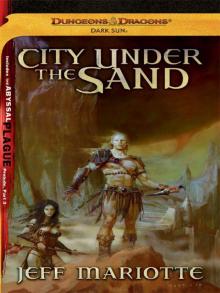 City Under the Sand
City Under the Sand The Burning Season
The Burning Season Sanctuary
Sanctuary Winds of the Wild Sea
Winds of the Wild Sea Serpents in the Garden
Serpents in the Garden Close to the Ground
Close to the Ground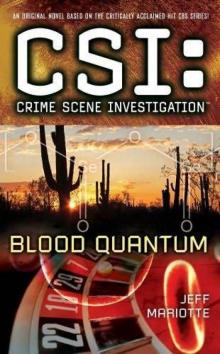 Blood Quantum
Blood Quantum Brass in Pocket
Brass in Pocket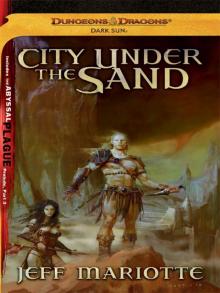 City Under the Sand: A Dark Sun Novel (Dungeons & Dragons: Dark Sun)
City Under the Sand: A Dark Sun Novel (Dungeons & Dragons: Dark Sun)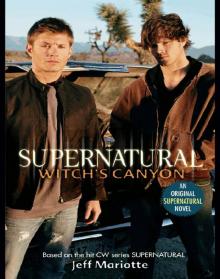 Witch's Canyon
Witch's Canyon STAR TREK: The Lost Era - 2355-2357 - Deny Thy Father
STAR TREK: The Lost Era - 2355-2357 - Deny Thy Father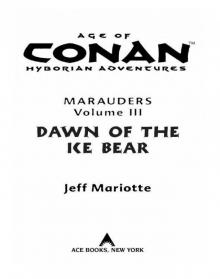 Dawn of the Ice Bear
Dawn of the Ice Bear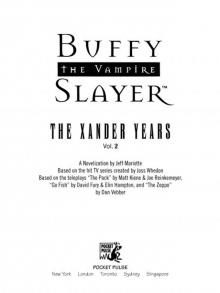 The Xander Years, Vol.2
The Xander Years, Vol.2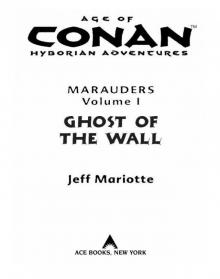 Ghost of the Wall
Ghost of the Wall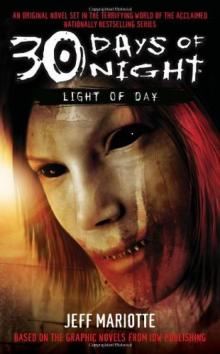 30 Days of Night: Light of Day
30 Days of Night: Light of Day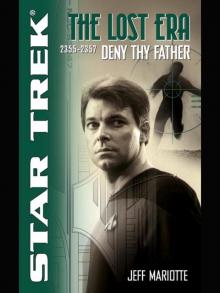 Deny Thy Father
Deny Thy Father Criminal Minds
Criminal Minds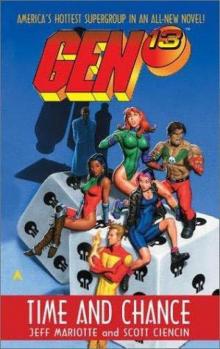 Time and Chance
Time and Chance The Folded World
The Folded World Bolthole
Bolthole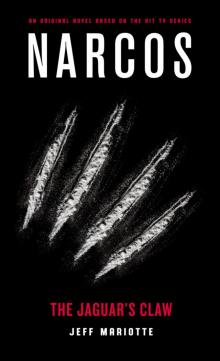 Narcos
Narcos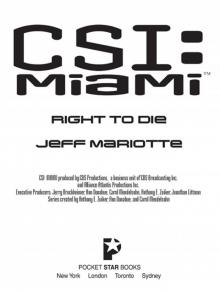 Right to Die
Right to Die